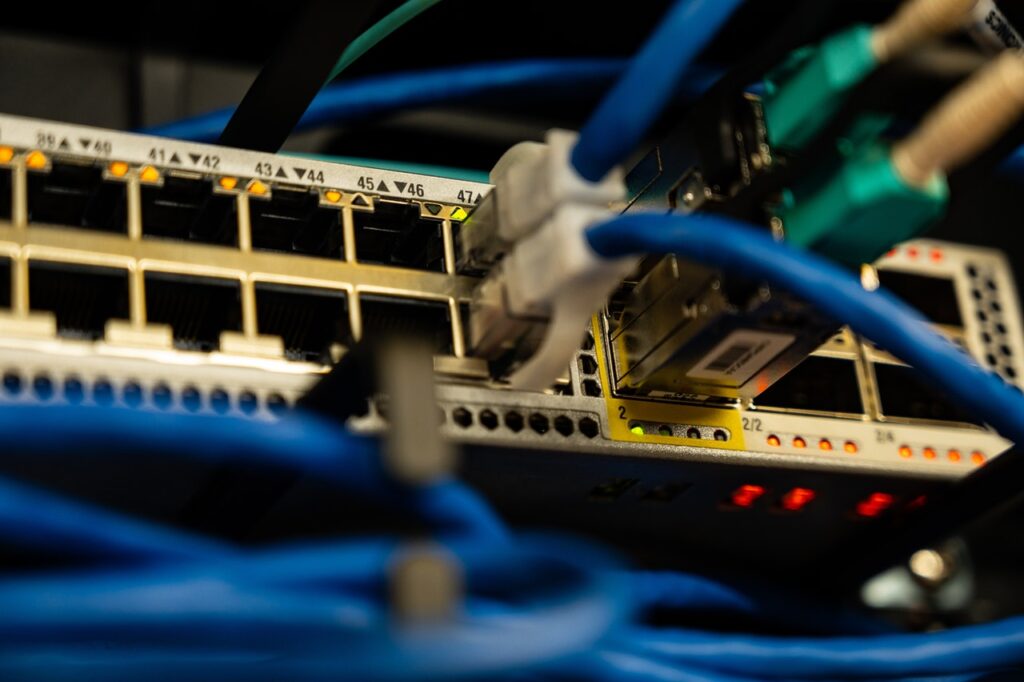As your business grows, you will need to upgrade your network infrastructure to accommodate the increased traffic. One of the most critical components of a network is the switch. A switch allows you to connect multiple devices to your network and manage the flow of traffic between them.
There are many different types of switches on the market, and it can be difficult to know which one is right for your business. This article will discuss some of the key factors you should consider when purchasing a switch.
What is a Network Switch?
A network switch is a networking device that connects devices on a computer network. Switches allow for communication between devices on different network segments, such as between the computers in a home and the router or modem that provides internet access.
Network switches come in many different varieties, including managed and unmanaged switches, Layer 2 and Layer 3, and desktop and rack-mountable switches. The type of switch best for your needs will depend on your specific networking requirements.
How Does a Network Switch Work?
A network switch works by reading the MAC addresses of packets passing through it and forwarding them to the appropriate device. When a packet is received, the switch looks up the MAC address of the receiving device in its internal table.
The switch forwards the packet to that device if the address is found. If not, the switch broadcasts the packet to all other ports except the port from which it was received. This process is repeated until the packet reaches its destination or is dropped because of too many collisions.
The Benefits of a Network Switch to Your Business
There are several benefits that Aruba switch can bring to your business:
Increased Network Speed: A network switch allows for communication between devices on different network segments, increasing the overall network speed. The switch creates a dedicated path for each device instead of forcing all traffic through a single point.
Increased Reliability: A properly functioning network switch can help to ensure that your business’s critical data is always available. Switches also provide redundancy, meaning that if one switch fails, the traffic will be automatically redirected to another switch in the network.
Easier Management: A managed switch allows you to manage your entire network from a single location centrally. This can save you time and money, as you will not need to hire a network administrator to manage your switches.
Increased Security: A switch can help improve the security of your business’s network by providing enhanced access control and firewall features.
Scalability: A switch is a scalable networking device, which means that it can be easily upgraded as your business grows.
The Difference Between a Network Switch and Routers
A network switch and router are two devices that are commonly used in computer networking. They both can connect devices and communicate with each other, but they work differently.
A network switch is a device that allows devices on the same network to communicate with each other. It does this by sending data packets from one device to another. A router is a device that connects two networks and allows communication between them. It does this by forwarding data packets from one network to another.
So, the main difference between a network switch and a router is that a switch allows communication between devices on the same network, while a router enables the communication between different networks.
The Dangers of a Poor Quality Switch
A poor-quality network switch can pose a danger to your business. A switch that cannot handle the traffic load or that regularly fails can cause network outages, leading to lost revenue and customers. In addition, a malfunctioning switch can also be a security risk, as it could allow unauthorized access to your network.
Choosing a reputable network switches supplier and investing in high-quality equipment is essential. Doing so will help ensure that your network is reliable and safe.
Key Factors in Purchasing a Network Switch
So, what are some key factors in purchasing a switch? There are several key factors that you should consider when you want to buy an Aruba switch. These include:
Network Speed
One of the most important factors to consider is the speed of the switch. The switch you choose should handle your network’s current and future traffic levels. If you expect your network to grow, make sure to select a switch that can accommodate that growth.
Power over Ethernet
Another essential factor to consider is whether or not the switch supports Power over Ethernet (PoE). PoE allows you to power IP phones and wireless access points through the Ethernet cable. This can save you money on power and outlet costs.
Form Factor
Another factor to consider is the form factor of the switch. There are three common form factors: desktop, rack-mountable, and wall-mountable.
- Desktop switches are small and easy to install, but they typically do not have a lot of ports.
- Rack-mountable switches are designed for use in a server rack, and they usually have more ports than desktop switches.
- Wall-mountable switches are designed to be mounted on a wall, and they also typically have more ports than desktop switches.
Number of Ports
The number of ports on a switch is another essential consideration. You will need to decide how many devices to connect to your network and choose a switch with enough ports to accommodate them. If you expect your network to grow, make sure to select a switch with more ports than you currently need.
Business Requirements
Another factor to consider is your business requirements. If you have specific requirements for your network, such as support for voice over IP (VoIP) or video streaming, make sure to choose a switch that supports those requirements.
Managed Switch
A managed switch is a type of switch that allows you to manage and configure the settings on the device. This can be helpful if you want more control over your network or need to troubleshoot problems.
Voice-Ready Switching
If you plan on using VoIP on your network, you will need to choose a switch that supports voice-ready switching. This type of switch is designed for VoIP (www.ringcentral.com/how-does-voice-over-ip-work.html) and includes quality of service (QoS) and Call Admission Control (CAC).
Conclusion
There are several key factors to consider when purchasing a network switch. Make sure to consider the speed of the switch, the number of ports, and your business requirements. Also, be sure to choose a reputable supplier and invest in high-quality equipment. Doing so will help ensure that your network is reliable and safe.









Leave a Comment
You must be logged in to post a comment.